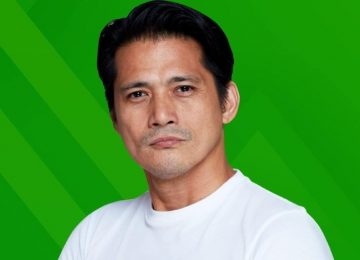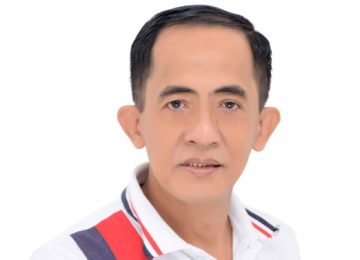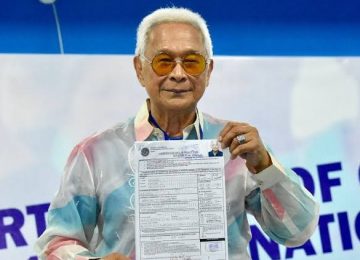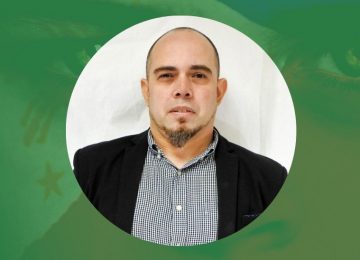Ferdinand “Bongbong” Marcos Jr., 64, son and namesake of the late ousted dictator, was elected unopposed into vice gubernatorial seats in Ilocos Norte at the height of his father’s regime in 1980, and eventually into congressional seats representing the same province after his family’s return to the Philippines in 1991. He also served as a senator from 2010 to 2016 before losing a bid for higher office to Vice President Leni Robredo in the 2016 elections.
In at least three civil cases involving the successful recovery of the Marcos family’s ill-gotten wealth, Marcos Jr. is impleaded as a defendant. The Presidential Commission on Good Government, the quasi-judicial agency tasked with recovering ill-gotten wealth accumulated by the Marcos family and its associates, has so far reclaimed P174.2 billion as of March 2021 — some of which went to compensating victims of human rights abuse during the Martial Law era. Another P125.9 billion has yet to be recovered and remains under litigation.
The commission has said that the younger Marcos barred government attempts to take back the money stolen by his family, though Marcos claims that he never possessed or even benefitted from ill-gotten wealth.
Marcos is campaigning on improving the country’s pandemic response and continuing the Duterte administration’s anti-insurgency campaign as well as its bloody campaign against illegal drugs but with a focus on prevention, education, and rehabilitation.
His tandem with Davao City Mayor Sara Duterte, the incumbent president’s daughter, is formally backed by several other heavyweight political clans including those led by former Presidents Gloria Macapagal-Arroyo and Joseph Estrada.
The tandem is also backed by Apollo Quiboloy, a fugitive Davao-based pastor who is a spiritual advisor to President Duterte. He was added to the United States Federal Bureau of Investigation’s wanted list in February 2022 after he was indicted by American federal prosecutors for a series of alleged criminal acts, including orchestrating a sex trafficking operation within his church.
Marcos occupied various executive positions in the local government of his family’s bailiwick, Ilocos Norte, where he was tasked primarily to enforce laws and regulations and administer basic social services. Marcos was also elected to local and national legislative positions as a congressman representing the same province.
None of the 42 bills principally authored by Marcos during his two terms in the House of Representatives were passed into law, though some of the bills he filed ultimately contributed to the passage of laws that created the Department of Energy and the National Youth Commission.
Full Name: Ferdinand “Bongbong” Romualdez Marcos Jr.
Birthdate: Sept. 13, 1957 (Age 68)
Birthplace: Sta. Mesa, Manila, Philippines
Religion: Roman Catholic
Languages Spoken: Filipino, English
Parents:
Ferdinand Marcos Sr. (1917-1989), father, House of Representatives (1949), Senate (1959), elected President in 1965 and 1969; dictator following declaration of Martial Law from 1982 to 1986
Imelda Remedios Visitacion Trinidad Romualdez (1929), mother, First Lady (1965 to 1986), First Governor of Manila (1975-1986), Congresswoman (1st District of Leyte 1996, 2nd District Ilocos Norte 2010-2013, 2013-2016, 2016-2019)
Spouse: Louise Cacho Araneta, Lawyer, 1993 to present
Siblings:
Maria Imelda Josefa “Imee” Romualdez Marcos, Senator (2019 to present)
Irene Romualdez Marcos-Araneta
Aimee Romualdez Marcos
Children:
Ferdinand Alexander Marcos, Political Affairs Officer, Office of Congressman Martin Romualdez, 2019 to present
Joseph Simon Marcos
William Vincent Marcos
Education:
- Secondary School, Worth School England, 1970-1974
Work Experience:
- Senator; 2010 to 2016
- Congressman (Ilocos Norte 2nd District Rep.); 2007 – 2010, 1992 – 1995
- Ilocos Norte Governor; 1998 – 2007, 1983 – 1986
- Ilocos Norte Vice Governor; 1981 – 1983
Ferdinand R. Marcos Jr., nicknamed ‘Bongbong‘, was born on September 13, 1957, to Ferdinand E. Marcos and Imelda Remedios Visitacion Romualdez. His father Ferdinand Sr. was representative of the Second District of Ilocos Norte when he was born, and became senator two years later. His godfathers included prominent Marcos cronies Eduardo “Danding” Cojuangco Jr., and pharmaceuticals magnate Jose Yao Campos.
Marcos first studied at the Institucion Teresiana and La Salle Greenhills in Manila, where he obtained his kindergarten and elementary education, respectively.
In 1970, Marcos was sent to England where he lived and studied at the Worth School, an all-boys Benedictine institution in West Sussex, England. He was studying there when his father declared martial law throughout the Philippines in 1972.
He then enrolled at St Edmund Hall, Oxford to study Politics, philosophy, and Economics (PPE). However, despite his false claims that he graduated with a bachelor of arts in PPE,[ he did not obtain such a degree. Marcos had passed philosophy, but failed economics, and failed politics twice, thus making him ineligible for a degree. Instead, he received a special diploma in social studies, which is awarded mainly to non-graduates.
Marcos enrolled in the Masters in Business Administration program at the Wharton School of Business, University of Pennsylvania in Philadelphia, United States, which he failed to complete. Marcos asserts that he withdrew from the program for his election as vice governor of Ilocos Norte in 1980.The Presidential Commission on Good Government later reported that his tuition, USD10,000 monthly allowance, and the estate he lived in while studying at Wharton, were paid using funds that could be traced partly to the intelligence funds of the Office of the President, and partly to some of the 15 bank accounts that the Marcoses had secretly opened in the US under assumed names.
After his father’s death in 1989, President Corazon Aquino permitted the return of the remaining members of the Marcos family to the Philippines to face various charges. Bongbong Marcos was among the first to return to the Philippines. He arrived in the country in 1991 and soon sought political office, beginning in the family’s traditional bailiwick in Ilocos Norte.
After Marcos returned to the Philippines in 1991, Marcos ran for and was elected representative of the second district of Ilocos Norte to the Philippine House of Representatives (1992–1995). When his mother, Imelda Marcos, ran for president in the same election, he decided against supporting her candidacy, and instead expressed support for his godfather Danding Cojuangco. During his term, Marcos was the author of 29 House bills and co-author of 90 more, which includes those that paved the way for the creation of the Department of Energy and the National Youth Commission. He also allocated most of his Countryside Development Fund (CDF) to organizing the cooperatives of teachers and farmers in his home province. In October 1992, he lead a group of ten representatives in attending the first sports summit in the Philippines, held in Baguio City.
In 1995, Marcos ran for the Senate under the NPC-led coalition, but placed only 16th.
In 1995, Bongbong Marcos pushed a 1995 to allow the Marcos family to keep a quarter of the estimated US$2 billion to US$10 billion that the Philippine government had still not recovered from them, on the condition that all civil cases be dropped – a deal that was eventually struck down by the Philippines’ Supreme Court
Having previously served as Ilocos Norte governor from 1983 to 1986, Marcos was again elected as governor of Ilocos Norte in 1998, running against his father’s closest friend and ally, Roque Ablan Jr. He served for three consecutive terms ending in 2007.
In 2014, Bongbong Marcos was implicated by Janet Lim Napoles and Benhur Luy in the Priority Development Assistance Fund (PDAF) Pork Barrel scam through agent Catherine Mae “Maya” Santos. He allegedly channeled PHP100 million through 4 fake NGOs linked with Napoles. Marcos claimed that the large amounts of money was released by the budget department without his knowledge and that his signatures were forged. In connection to the PDAF scam, Marcos was also sued for plunder by IBalik ang Bilyones ng Mamamayan (iBBM), an alliance of youth organizations. The group cited Luy’s digital files, which showed bogus NGOs with shady or non-existent offices
Marcos maintains a YouTube channel, and accounts on Twitter and Facebook. In December 2016, Marcos celebrated a Christmas party with his online supporters.
According to research by Vera Files, Marcos benefited the most from fake news from the Philippines in 2017, along with President Rodrigo Duterte. Most viral news were driven by shares on networks of Facebook pages. Also, most Philippine audience Facebook pages and groups spreading online disinformation bore “Duterte”, “Marcos” or “News” in their names and are pro-Duterte.
In July 2020, Brittany Kaiser alleged in an interview that Marcos had approached the controversial firm Cambridge Analytica in order to “rebrand” the Marcos family image on social media. Marcos’ spokesperson Vic Rodriguez denied these allegations and stated that Marcos is considering filing libel charges against Rappler, which published Kaiser’s interview.
Personal life
Bongbong Marcos is married to Louise “Liza” Cacho Araneta, a member of the prominent Araneta family, with three sons: Ferdinand Alexander III “Sandro” (born 1994), Joseph Simon (born 1995) and William Vincent “Vince” (born 1997). Although he is of Ilocano ancestry, he does not know how to speak the Ilocano language.
On March 31, 2020, Marcos’ spokesperson confirmed that Marcos had tested positive for COVID-19.










